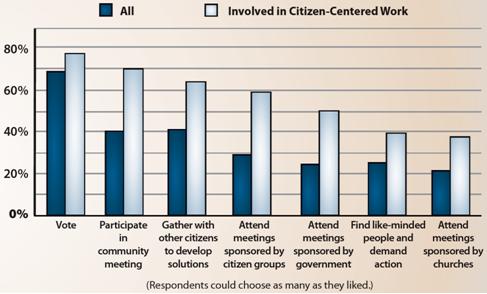« Open Congress | Main | Mobilize releases the Declaration of our Generation »
October 4, 2007
America's civic core
Today, the National Conference on Citizenship released its annual Civic Index report, which we worked on heavily. The most innovative aspect of the report was a decision to focus on a new set of civic activities--not ones that we should hope everyone would undertake (such as voting and volunteering), but relatively demanding forms of engagement. We defined a group that does "citizen-centered work" (using the terminology of Cindy Gibson's white paper for the Case Foundation). This means a combination of talking about issues and working directly to address problems. Look at how heavily engaged this group of millions is:
We also defined groups of "deliberators" (who participate in diverse discussions of issues) and "netizens" (who participate heavily online). They too are heavily engaged and well-informed.
I can describe how I got to this approach by way of an imaginary dialog:
Realist: Americans are resistant to conflict and controversy. They opt for consumerism and limit their political conversations to people just like themselves in order to avoid the tensions that arise when serious issues are on the table and participants have diverse values. ("Realist" may have been reading books that present impressive and depressing empirical evidence, written by Diana Mutz, Nina Eliasoph, and John Hibbing and Elizabeth Theiss-Morse).
Idealist: We know how to recruit diverse people for deliberative forums, train them to hold respectful, productive discussions, moderate these discussions, reach constructive conclusions, act voluntarily, and bring their experience back into discussions. ("Idealist" may have been reading the Deliberative Democracy Handbook, edited by John Gastil and me.)
Realist: What powerful, large, well-funded institutions have incentives to organize these forums? Not political professionals, corporations, parties, or the mass media. Deliberations will always be small-scale experiments, organized by boutique programs, and limited to highly civic communities.
I've struggled with Realist's rejoinder for a while, and this is what I'm now prone to say:
Peter (the chastened idealist): Everyone has the right and the intrinsic ability to participate, but we'll never have the resources or incentives to achieve a truly deliberative democracy on a mass scale. Yet our new survey shows that a significant minority of Americans actually do deliberate with other people and use the results to guide their civic behavior, such as their volunteering. Our strategy should not be to raise that proportion to 50% or 100%--although 25% might be achievable. Instead, we should strive to make the civic minority in America fairly representative of our nation's diversity. We should give those people the tools, institutions, and resources they need. We should increase their political clout. We should build networks to connect them with one another. And we should make sure that all Americans have a shot at entering this civic minority even if they come from very disadvantaged backgrounds.
October 4, 2007 3:05 PM | category: deliberation | Comments
